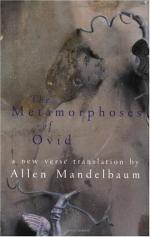|
This section contains 2,131 words (approx. 8 pages at 300 words per page) |

|
SOURCE: Keith, A. M. “Etymological Wordplay in Ovid's ‘Pyramus and Thisbe’ (Met. 4.55-166).” Classical Quarterly 51, New Series, no. 1 (2001): 309-12.
In the following essay, Keith gives examples of how Ovid uses wordplay to reinforce narrative relationships.
A wide range of readers and artists has enjoyed Ovid's ‘Pyramus and Thisbe’,1 but the tale has provoked critical attention on two counts: Ovid's source(s) cannot be identified2 and the simile applied to Pyramus' death agonies ruptures the sentimental tone of the narrative (4.121-4).3 In classical Greek literature, Pyramus is the name of a Cilician river mentioned by geographical writers and historians in geographical contexts,4 while Thisbe is the name of a famous Boeotian city5 and an obscure Cilician spring.6 Late antique Greek mythographers give these names to human figures, young lovers who die tragically and are metamorphosed into the Cilician river and spring.7 No extant Latin versions of the tale are...
|
This section contains 2,131 words (approx. 8 pages at 300 words per page) |

|


